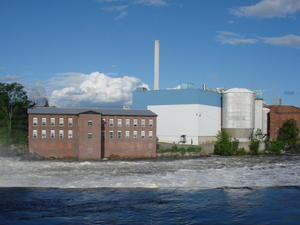Biobased Maine Statement on the Renewable Chemicals Act of 2017

Policy like the proposed Renewable Chemicals Act will help facilitate re-development of idle industrial infrastructure (like the Madison mill, here), which can be re-purposed to manufacture high-value biobased products with Maine wood that currently lacks markets.
Biobased Maine would like to thank Senator Susan Collins for her leadership in the Renewable Chemicals Act of 2017 (S.1980), proposed legislation introduced Thursday that offers short-term tax credits for the production of biobased chemicals from biomass.
Biobased Maine is actively pursuing new biobased manufacturing projects in Maine, such as the manufacture of high-value biobased chemicals from Maine wood that currently lacks markets. Policy like the Renewable Chemicals Act of 2017 will help facilitate new investment, which will lead to good manufacturing jobs in rural Maine and help ensure the long-term sustainability of our forest industry.
Last week, ReEnergy announced a partnership with Biobased Maine to find new technologies for co-location at their biomass facilities in Maine. These technologies could include the manufacture of cellulosic sugars or other high-value biobased chemicals, which could qualify for the proposed tax credit.
Earlier this year, Biobased Maine partnered with Sappi North America to publish a similar RFP, looking for biobased technologies for co-location at the Sappi Westbrook mill.
Charlotte Mace, Biobased Maine’s Executive Director, said, “Maine’s biobased economy is growing. Maine companies are very interested in grabbing global market share in the rapidly expanding biobased chemical market. Some companies in Maine, such as Biofine (Old Town), are already making biobased chemicals.”
Governor Paul LePage, a keynote speaker at the Advanced Bioeconomy Leadership Conference in San Francisco last week, told conference attendees that Maine is open for business. The Governor pointed out that, “Maine is 90 percent forest. We have 39 different commercial species of [wood] fiber. 95 percent of the forest in Maine is owned privately. Now we’re talking about Maine’s bioeconomy and attracting investment to Maine.”
Patrick J. Strauch, Executive Director of the Maine Forest Products Council, said, “The global forest industry is entering an exciting era of biobased products made from trees. Senator Collins knows how important these opportunities are for Maine’s forest economy and we appreciate her sponsorship of the Renewable Chemicals Act.”
Donna Cassese, Managing Director of Wood Resource Strategy at Sappi North America, said, “Sappi North America values Senator Collins’ continued advocacy for the forest industry including her recent co-sponsorship of the Renewable Chemicals Bill.”
Across the globe, demand for advanced biobased products continues to grow rapidly. Worldwide production of biobased products—including high-value biobased chemicals—is projected to grow from approximately $203.3 billion in 2015 to $487 billion by 2024.
